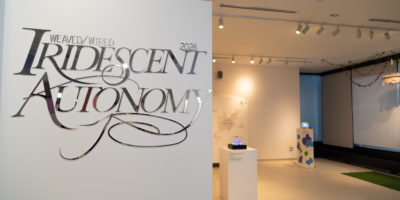By Shanti Zachariah
Outstretched arms, veins exposed and bulging on her neck and shoulders, palms open and fingers grasping claw-like in the air — this is the recurring pose assumed by the central character Medea throughout the play Medea. It is a stance of simultaneous violence and vulnerability. She could be readying herself to lunge at someone or throwing up her arms in self defence. Which one is it?
The original Medea was penned by Greek playwright Euripides. The version playing at Buddies in Bad Times is that of 20th century dramatist Jean Anouilh. The play and its dialogue are straightforward; the clean, pared down language doesn’t detract from the play’s intensity, and it allows Madea’s conflict to remain clear throughout.
Helene Clarkson plays Medea. She rages, heaves and sputters her hate and pain. Her wilful passion has turned murderous. Her body always seems ready to spring forward in attack and her mouth is perpetually twisted in anger. “Everything vile and dark is deposited in me,” she growls. And with good reason.
Medea’s husband, the warrior Jason, leaves her and her two kids after 10 passionate and adventurous years of marital bliss. Jason married Medea because he wanted her father’s, King Aetes’, golden fleece. Medea complied, even though this entailed betraying her father and killing her brother.
Now, 10 years later, Jason has decided he wants out and gets engaged to the King of Creon’s daughter. Guess what? Medea is really pissed off.
Clarkson has chewed her character down to the bones; it is a grand workout. I wonder if she must collapse onto her couch, exhausted at the end of the day, with a bag of doritos and a TV guide.
Jason (played by Tom Barnett) seems purposely subdued. With blond hair and cream and khaki riding clothes, he literally pales next to Medea’s lustful self-loathing. His head is full of future hopes of domestic bliss with the King’s daughter — his new sweet young thing.
As for Medea, well, she’s pretty much ready to explode. Jason’s musing about their past love mean nothing to her. His betrayal overshadow everything. She can no longer contain her hate. “I am killing everything inside of me gently,” she says. And her final act of revenge makes that real — she murders their two sons and sets herself on fire.
There is a moment of brief comedy near the end of the play. A guard set to watch the fire until it burns out lights a cigarette with one of the dying flames, takes a deep satisfying puff, and stares up at the stars. This is the peace Medea could never have. She is a character of extremes, embodying both the “wronged woman” archetype and that of the destroyer-goddess. WIth the same passion, she gives life and she takes it away.
Many of us, perhaps most of us, just want someone to love and their own field to till, so to speak. As the watchman finds out, there’s something to be said for sticking around to watch the sun come up.












Leave a Reply